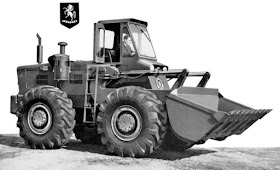It had a dramatic formation, and was established by people not new to its field of engineering. It was formed in February 1934 when Aveling and Porter of Rochester, Kent effectively went bankrupt, when the parent company Agricultural & General Engineers (AGE) went into receivership in 1932.
At the same time Barford & Perkins (related to today's Perkins Engines) of Peterborough were also entering administration. Frank Perkins worked for his family company of Barford & Perkins, and also Aveling and Porter. These two companies were Britain's two leading manufacturers of road rollers.
Aveling & Porter Ltd had been formed in 1850, becoming a public company on 16 July 1895, then a private company in 1919, and acquired the assets of Barford & Perkins Ltd in 1932, which had been formed in 1840. The name changed to Aveling-Barford on 13 February 1934.
Early in 1934 the business was transferred from Rochester to Grantham on a 36-acre site which was leased from R & H. On the board of directors were Edward James Barford and William Geoffrey Barford (from Barford & Perkins), and John Heinrich Wulff Pawlyn, a Director of R & H based at the Ransomes subsidiary in Ipswich, and George Ruston Sharpley, the managing director of R & H.
Austin-Western USA
Without the financial assistance of Ruston & Hornsby of Lincoln, both companies would not have survived. R & H funded the amalgamation of the two companies, and gave them part of their Grantham site. For many years all the vehicles were powered by R & H diesel engines. R & H had also previously made road rollers, but concentrated this all at Grantham.
In the 1930s it made cooling equipment for dairy farms, and cooking equipment for hotels, hospitals, and canteens. It became a public company on 29 June 1937. At this time it claimed to make 75% of the road rollers in Britain, and world leaders in their field.
Edward Barford (23 April 1898 – 11 July 1979) became the Chairman of the company from 1933, remaining until 1968. It began making its first earth moving equipment – the Aveling Dumper.
During the Second World War the company made Bren Gun Carriers, shell fuse caps and the Loyd Carrier.
The company also made calfdozers (small bulldozers). From April 1946 two subsidiary companies were formed – Barford Developments Ltd and Barford (Agricultural) Ltd.
On 17 September 1946 a new factory in Newcastle upon Tyne was opened.
In 1967 it became part of British Leyland.
British Leyland engines were to be used as part of the deal, but there were reliability problems.
Aveling-Barford were best known for their line of three-point roadrollers including the small GA up to the GC, The "Master Pavior" 3-point roller was one of the most famous diesel rollers. However many other types of earthmoving machinery were designed and manufactured by Aveling Barford in England.
A-B were also significant for their all wheel driven and all wheel steering motor graders often using Leyland Trucks running gear as were also producers of ADT models called the RDX Series with 6X6. A line of rigid dumpers was manufactured from 30 tonne RD030 through to the 50 tonne RD050 and eventually a RD55 and RD65 were added.
A new dumptruck the RD44 was unveiled at Bauma to try and rejuvenate the line of dumptrucks but with limited success
During the 1970s to the 1980s A-B were producing their own range of front loaders with 4X4 axles and are fitted with Cummins, Leyland or Ford heavy duty diesel engines. They resembled the popular British made BRAY or FORD loader models of the 1980s.
Site dumpers were first mass manufactured by A-B in the 1940s mostly with Fordson Tractor Diesel engines. Today these are still made and sold under the Barford name












Ei kommentteja:
Lähetä kommentti